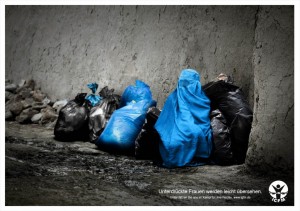There are many not so nice things about being immediately recognizable as a Muslim in today’s world, but there are a few things that are, usually, nice. One of them is what I like to call the salam nod. You spot a fellow Muslim, and do a nod of acknowledgement, and depending on how you feel and the context, you either say a short salam or sing out the whole long greeting. And sometimes conversations happen. And sometimes this makes your day.
I get the salam nod an average of three times a day, including the times a Roma woman will come up to me and give me a salam, then hold out a paper cup. This is a phenomenon that has made some Muslims unreasonably angry. They often refer to an investigative BBC program about Roma women begging (where if there was any outrage directed at the Roma it should be about child exploitation) and instead complain that they “pretend to be Muslim.” The program itself has some serious problems, including one man opining that the beggars can’t be Muslim because they “don’t speak Arabic.” At another point, as the presenter ponders whether or not the beggars are really Muslim, one of the women spots the camera spying on her and, infuriated, lifts her skirt. “Not very Islamic,” the presenter critiques.
That beggars “target” Muslims has been noted by other media, including this article, that notes the Roma often target “wealthy Arabs and other Muslims shopping in Oxford Street and on the nearby Edgware Road” because “They are rich hunting grounds; it is a central tenet of Islam to give alms, and many Muslims discharge this by giving to beggars.”

Hena Zuberi wrote about this phenomenon earlier this year over at Muslim Matters. While she discusses the persecution of the Roma and their marginalization, she uses the “pretend to be Muslim” angle as confirmation that they are perpetuating a scam, that they are “not really in need.” Zuberi is particularly upset by beggars who linger outside mosques during Eid: “The woman looks like she is in need, she also knows the right things to say.” One response in the comments by a woman who identifies as Romani points out that a) many of these women are not “pretending to be Muslim” but dressing according to their culture, b) some are in fact Muslim, and c) the point actually isn’t what their religion may or may not be.
Romani don’t dress “modestly” or with headscarves to appear Muslim. It is part of our culture, as many others, for women to cover themselves…However, no matter whether the women and children you see are Muslim Romani or not, they ARE in need.
In Sweden, we recently had a furore over an anti-begging advert by the Swedish Democrats, who are upset by the rise of Roma beggars. The advert targets tourists and is in English. “Sorry about the mess here in Sweden. We have a serious problem with forced begging,” it says.
The ad that compared beggars to a “mess” were quickly ripped down by demonstrators, but in another advert you can see on the subway in Stockholm, “Sweden should do better than this” is emblazoned in white over images of homeless people sleeping on the streets. The idea is that Sweden should “clean up” this mess of humanity.

The image reminded me of the infamous image of Afghan women as trash. Although Germany’s International Human Rights ad campaign was intended to fight for the rights of those “easily overlooked” and the anti-begging campaign is angry that the homeless are not more easily overlooked, both present people, human beings, as so much garbage. We have so much work to do, the images imply, to get these huddled inferior beings to walk upright and be “normal”, like us.

Sweden is not alone in regarding beggars as a “mess,” of course. The anti-homeless spikes on shop doorways and the “quality of life” crimes make clear that today, it is the visibility of poverty that is objectionable, not the fact that there is poverty.
Some Muslims might see the “pretend Muslim” beggars as perpetuating a scam, even an offensive ploy, but I am puzzled by this. Why would you be upset that someone regards you as generous – albeit apparently only to those of your own religion? The perception that the religious only give charity to those of your own religion, or only as a way to promote their religion, reminds me of an image I once saw of a beggar with several bowls laid out, each labeled “Muslim” or “Pagan” or “Buddhist” and so on, and a sign that said “Which religion cares more about the homeless?” It’s a clever tactic, cheekily exposing people’s competitive piety and the often hypocritical notion of “charity.”
The outrage that the “pretend Muslim” Roma beggars are not really Muslim seems to play into this, and to me it is almost comically misplaced. Perhaps be more outraged about the history of persecution, and the ongoing marginalisation of the Roma people instead? And perhaps instead of citing a hadith that says “work rather than beg”, disregarding that work is not universally available, we should remember that there is no ruling that giving sadaqah is only for Muslims.













